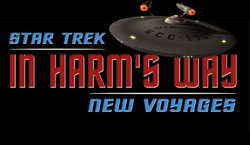 I’m astonished and impressed. I just watched the two, fan-made, original STAR TREK "episodes" that were written about in this month’s issue of WIRED magazine:
I’m astonished and impressed. I just watched the two, fan-made, original STAR TREK "episodes" that were written about in this month’s issue of WIRED magazine:
Just like the original series, each New Voyages episode
lasts 51 minutes and is structured in five acts (act breaks are where
the commercials would go, if there were any). Like the original, New Voyages begins with that ethereal theremin score. Like the original, New Voyages favors bold primary colors, velour uniforms, and leggy women in miniskirts.
The acting and writing are cringe-inducing but everything else is amazing. I can’t believe what these imaginative and extremely talented film-makers were able to accomplish on a shoe-string budget (though it helps to have the FX pros from STAR TREK ENTERPRISE over-seeing the effects).
The STAR TREK: NEW VOYAGES episodes, made with the permission of Paramount and with the cooperation of the Roddenberrys, succeed brilliantly at capturing the feel, sound and look of the original series, more so than STAR TREK ENTERPRISE was able to do in their clunky, fourth season two-parter.
The first two STAR TREK: THE NEW VOYAGES episodes are available free for download (including a DVD version that looks surprisingly good on a big-screen TV). They are worth a look. The third episode promises to be even more polished:
Each New Voyages episode is produced with the help of a growing network of Star Trek professionals. The makeup supervisor for the new episode, for example, is Kevin Haney, who worked on one of the many Trek TV series spun off from the original (and won an Oscar for makeup in Driving Miss Daisy). The script is by D. C. Fontana, a story editor for the original Star Trek series and author of some of its most beloved episodes. (Who can forget the one where Kirk steers the Enterprise
into the Neutral Zone, near Romulan territory? Or the one that
introduces Spock’s parents?) And it will star Walter Koenig, the actor
who played navigator Pavel Chekov in the original series and seven of
the 10 films. The fact that Trek pros are taking part in this fan
project is something new in the world of filmmaking, the cinematic
equivalent of semi-pro ball.
…The value of the labor donated to New Voyages by Star Trek
professionals far exceeds any out-of-pocket expenses. Makeup supervisor
Kevin Haney directed a team whose bill would have come to tens of
thousands of dollars. The show’s special effects are supplied by
Cawley’s friend Max Rem (the professional CG f/x creator uses a
pseudonym to protect his day job). Rem worked on Star Trek for more than a decade, and he has worked on New Voyages since its inception in 2003. For the second New Voyages episode, Rem created more than 200 effects shots – from the Enterprise flying through space to backgrounds for greenscreen shots – all of which would have cost more than $1 million if he had billed New Voyages.
Watching the first two episodes of NEW VOYAGES makes you realize what ENTERPRISE should have been: a return to the STAR TREK we all fell in love with. Note to Paramount: It’s not too late.

